
Did you know that Thailand is emerging as a vibrant hub for specialty tea and coffee—uniting innovation, agro-tourism, and sustainability in a single breathtaking region?
I had the exciting honor of speaking at the Global Coffee and Tea Association Forum 2025, held in the lush, tea-growing highlands of Chiang Rai, Thailand. With the theme “Shaping the Future Together,” this international gathering was a celebration of collaboration, community, and innovation across the global tea and coffee industries.
Chiang Rai is one of those truly pristine places that instantly inspires. Surrounded by rolling green hills, high-altitude plantations, fresh mountain air, and a culture rich in craftsmanship, it’s no wonder Singha Park—Thailand’s leading agro-tourism destination—was a key host.
I’ve travelled to over 24 countries in my tea career, and I must say, Chiang Rai felt like a perfect convergence of purpose and passion. The hospitality was amazing, and the location made everything feel refreshingly grounded in nature.
Organized by Professor Piyaporn, Head of the Coffee and Tea Institute, and her team at Mae Fah Luang University, as well as Singha Park and the Thailand Convention and Exhibition Bureau, the forum brought together 211 delegates consisting of 165 Thai representatives and 46 overseas participants from 11 territories.
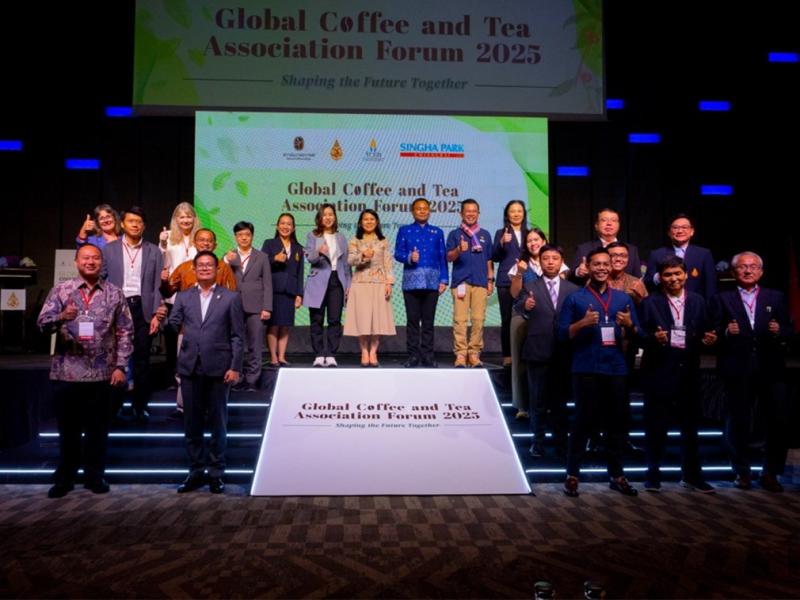
Our forum opened at the Le Meridien Chiang Rai Resort, where delegates from all over the world gathered—representing Australia, China, Japan, Denmark, Myanmar, Indonesia, Singapore, Colombia, Hong Kong Vietnam, and beyond. I was delighted to share my insights on global tea trends and the growing importance of innovation in specialty blends, wellness teas, and sustainable sourcing.
Event Highlights
Here are just a few moments that stood out:
Professor Dr. Mingzhe Yao’s presentation on the Chinese tea industry was astounding. China accounts for nearly 50% of the world’s tea production and over 65% of global tea acreage. But what impressed me most was the sheer scale of innovation—from smart picking machines and bio-pesticide strategies to Big Data monitoring and rapid pesticide detection. Even yellow tea and unique tea cultivars are gaining attention again—proof that traditional tea categories are evolving.
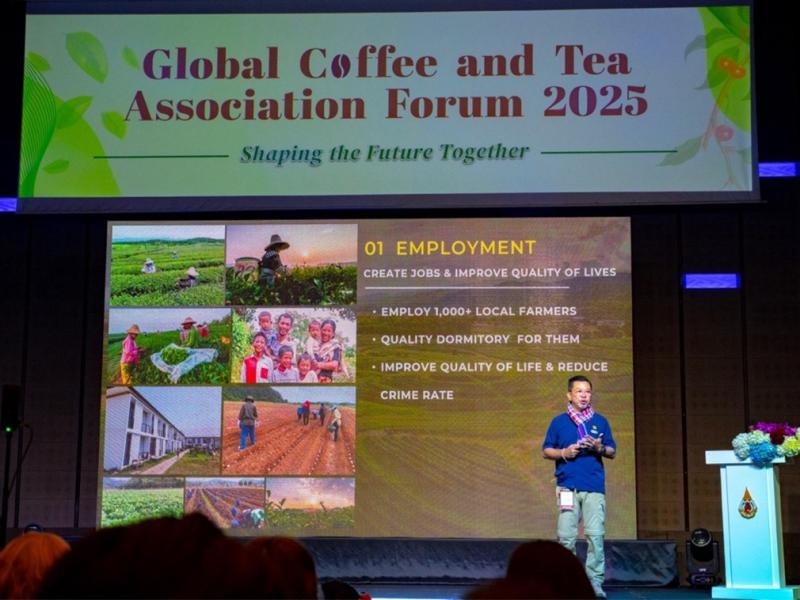
Mr. Chaiyapat Chaturongkul’s session on Singha Park brought the entire room to attention. As a social enterprise employing over 1,000 local farmers, Singha Park is proof that business can be a force for good. They grow premium-grade tea and use shading techniques, organic practices, and global certifications to ensure top-tier quality. I’ve always said tea starts with the grower—and this model showcases that beautifully. Their investment in R&D and the Norte Assam Tea Factory was also inspiring.
Indonesia’s Branded Identity Movement
Indonesia’s tea representative—Mr. Ronald Goenawan, General of the Specialty Tea Association and Manager at Bukit Sari, a well-known biodiversity tea plantation in Indonesia—spoke candidly about the urgent need to move away from bulk anonymous exports to a branded origin model—something I strongly support.
As tea educators, we have a vital role in helping producers tell their story and showcase traceable, premium-grade teas to global markets.
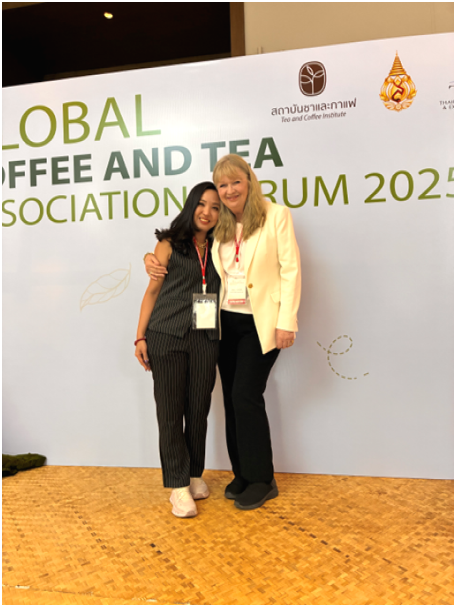
Ms. Alexis Kaae of the European Specialty Tea Association shared how Europe is quietly transforming tea culture. Her talk revealed a shift away from traditional black and green teas toward functional blends with herbs, adaptogens, and local botanicals like birch and nettle. Tea is now grown in 14 EU countries, with regenerative farming and low carbon footprints driving consumer choices.
From sparkling teas to cold-brewed oolongs, tea is reshaping hospitality and fine dining, especially in places like Copenhagen’s Alchemist. Designers, chefs, and herbalists are collaborating to create tea experiences that prioritize wellness, sustainability, and sensory design. In Europe, specialty tea is no longer just about origin—it’s about impact. This quiet revolution is redefining what tea can be.
Mr. Tsukamoto Tadashi from the World Green Tea Association delivered a compelling overview of Japan’s evolving tea industry. Despite producing 70,000 tons of tea annually, Japan has seen a 30% drop in production and 20% decrease in cultivation area over the past two decades. Domestic green tea consumption has also declined by 30%, with bottled beverages now making up 73% of household tea spending. Yet, Japan’s export story is remarkably positive—exports have quadrupled in volume and increased ninefold in value, reaching ¥36.4 billion in 2024. Matcha leads this growth, with tencha production rising 20% in five years. Japan’s green tea commands the highest price in the U.S. at $34.8/kg, highlighting its global premium status.
Cultural Deep Dive: From Tea Fields to Art Parks
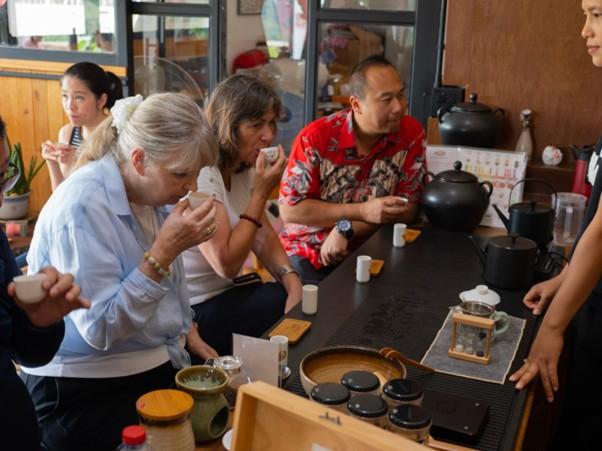
The excursions were breathtaking. At Choui Fong Tea Plantation, I walked through rows of meticulously shaded tea bushes and tasted freshly processed teas while chatting with local experts. At Mae Fah Luang University, we visited the Tea & Coffee Institute and discussed academic collaborations in sensory science and tea metabolomics—fascinating topics indeed!
One highlight? Touring Wang Put Tan and Choke Chamroen Tea Factories in Mae Sa Long—where organic oolongs grown at 1,350m elevation are exported to Europe. The teas had a beautiful, honeyed character—certainly equal to some of the best oolongs I have tasted, reminding me of similar top teas I’ve judged. One particular black tea won gold at a recent global tea competition.
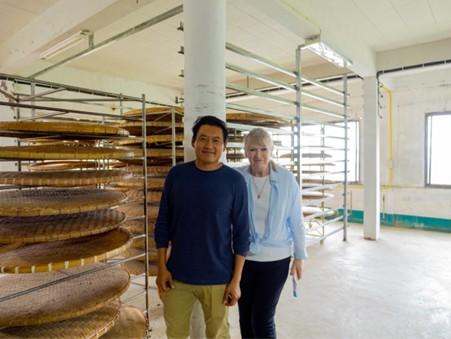
The Round Table event focused heavily on how the tea and coffee industries must evolve to meet the demands of next-generation consumers. Gen Z and Millennials are driving a shift toward health-conscious, ethically sourced, and experiential products. Participants emphasized the rise of functional drinks, low-sugar options, and ready-to-drink formats that align with busy lifestyles and wellness values. Innovation in processing technology, smart packaging, and traceability tools was highlighted as key to capturing trust and loyalty.
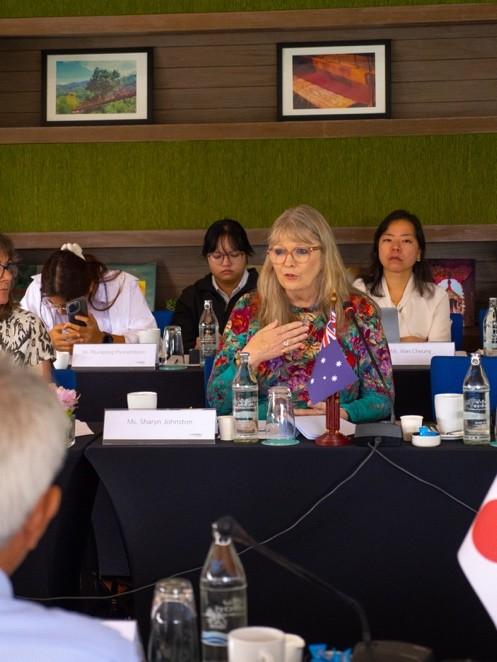
The panel also explored how storytelling, sustainability, and sensory design are becoming as important as flavor. Across all discussions, one theme was clear: Brands that innovate boldly and connect meaningfully with younger consumers will lead the future of tea and coffee.
Global Insights & Takeaways
- Climate resilience was a major talking point—especially during roundtables. Agroforestry, regenerative practices, and smart irrigation systems are essential.
- A shared challenge is the aging farmer population—making tea education vital for the next generation.
- Functional teas, floral and fruit fusions, and tea mocktails are redefining modern consumption—especially for Gen Z and wellness-focused consumers.
- Bringing tea and coffee together brought great satisfaction to us all. We can learn from each other.
From high-grade specialty teas and bubble teas in Indonesia, to native blends in Australia and alcohol-free pairings in Denmark, the global tea movement is unified in one direction: towards sustainability, innovation, and authenticity.
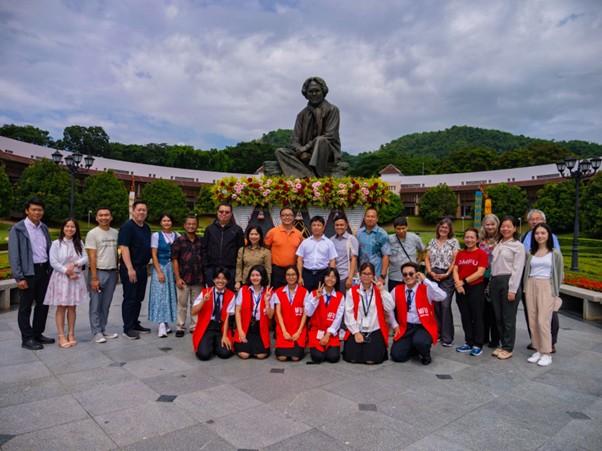
Looking Forward
It was deeply moving to witness how tea—so ancient, so humble—is becoming a modern force for community development, health, culture, and innovation. Events like this remind us that our work in education, product innovation, and supporting small farmers matters more than ever.
As I return to Australia, my suitcase is heavier (with teas I couldn’t resist!), but my heart is even fuller. The best time to embrace global collaboration, share knowledge, and brew meaningful change is now. Let’s continue to shape the future of tea and coffee—together.
Plan to Attend or Participate in World Tea Expo, March 23-25, 2026
To learn about other key developments, trends, issues, hot topics and products within the global tea community, plan to attend World Tea Expo, March 23-25, 2026 in Las Vegas, co-located with Bar & Restaurant Expo. Visit WorldTeaExpo.com.
To book your sponsorship or exhibit space at World Tea Expo, or to inquire about advertising and sponsorship opportunities at World Tea News, contact:
Ellainy Karaboitis-Christopoulos, Business Development Manager, Questex
Phone: +1-212-895-8493; Email: [email protected]
Looking for professional tea education, certifications, and more? Visit World Tea Academy and register for courses today!
Also, be sure to stay connected with World Tea Expo on social media for details and insights about the event. Follow us on X, Facebook, Instagram and LinkedIn.
